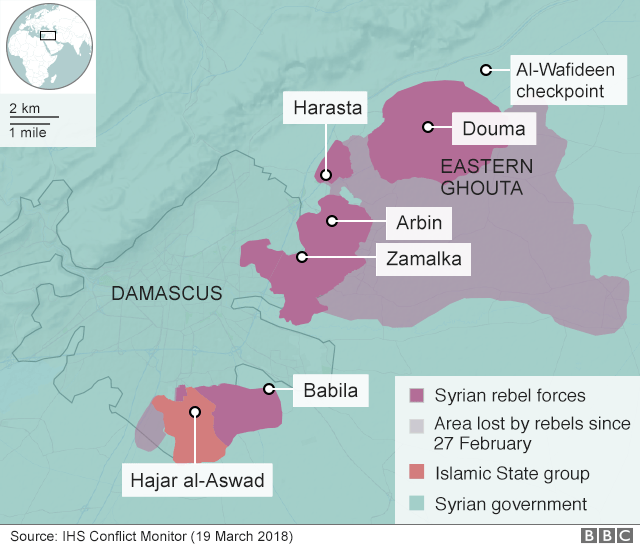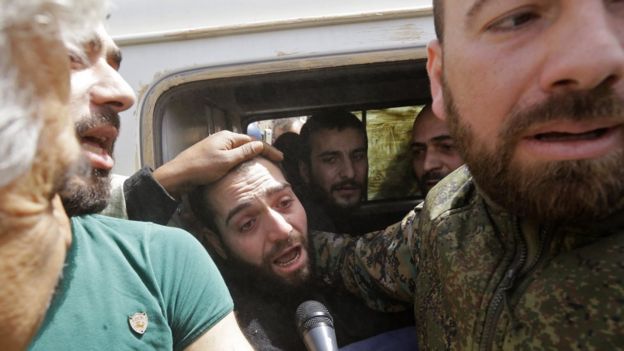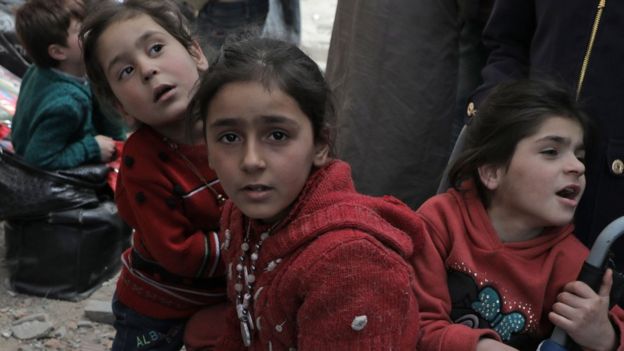
Syrian rebels and their families are being evacuated from a key town in the besieged Eastern Ghouta region as part of an agreement with the government.
State media said 1,452 civilians and 308 rebels had left Harasta so far.
It was not clear if they were among the 2,000 people who military sources said would be driven to the northern rebel-held province of Idlib on Thursday.
The evacuation deal is the first agreed since the offensive on the Eastern Ghouta was stepped up a month ago.
A monitoring group says the air and ground assault has killed 1,500 civilians, injured 5,300 others, and forced 82,000 to flee in recent days.
Government soldiers and allied militiamen have driven rebel forces out of about 70% of the region, cutting it into three pockets - one of them around Harasta.
The opposition council said 20,000 civilians were trapped there last week.
It said air and artillery strikes by the government and its allies during their five-year siege of the Eastern Ghouta had deliberately targeted civilians in the town and destroyed its infrastructure, denying them access to food and medical treatment.
Despite the onslaught, a Syrian military source told Reuters news agency that more than 18,000 people were expected to stay in Harasta under government rule.

Another 2,000 people, including 600 to 700 rebels from the Ahrar al-Sham group, would leave for Idlib on 40 buses on Thursday, the source added.
On Wednesday, state media reported that a total of 1,500 rebels and 6,000 civilians were expected to be evacuated under the deal with the government.
The implementation of the deal began on Thursday morning with a prisoner swap.
State TV reported that 18 people were freed, 13 of them held by the rebels. It interviewed a soldier among them, who thanked God and the army for his release.

A man freed as part of a prisoner exchange with Ahrar al-Sham was interviewed by state TV
Later, the Syrian Arab Red Crescent confirmed that its personnel had entered Harasta and it posted photos of them helping civilians on to buses.
By 17:00 (15:00 GMT) on Thursday, a total of 1,760 people, including 577 children, had left Harasta in buses, according to the official Sana news agency.
However, it did not say if they were being taken to Idlib or to reception centres in government-controlled Damascus after accepting a reconciliation agreement.
Ahrar al-Sham fighters in Harasta agreed to lay down their weapons in return for safe passage to Idlib, home to more than 2.6 million people.

Thousands of civilians left other rebel-held towns in the Eastern Ghouta on Thursday
Spokesman Monther Fares told the Associated Press that they had faced "civilian pressure" as a result of the intense air strikes, which had forced people to live underground for three months.
The BBC's Martin Patience in Beirut says the deal may put pressure on the rebel groups that control other parts of the Eastern Ghouta to follow suit.
Similar deals have been on the table with Jaysh al-Islam - which controls the northern pocket around Douma - and Faylaq al-Rahman - which controls the southern pocket around Arbin and Zamalka - but have yet to get anywhere.
Both factions have vowed to keep fighting, even as they have been driven further and further back.
Government air strikes on the southern pocket killed at least 19 people on Thursday, according to the Syrian Observatory for Human Rights.
The UK-based monitoring group also said more than 4,000 civilians had fled Douma on foot and crossed into government territory through the al-Wafideen checkpoint over the past 24 hours. The civilians were leaving under an agreement between Jaysh al-Islam and Russia, it added.
Rockets and mortars are also still being fired by rebels into government-held districts of Damascus. A police source told Sana that two civilians were killed and four others injured by a shell that hit the Barzeh area on Thursday.